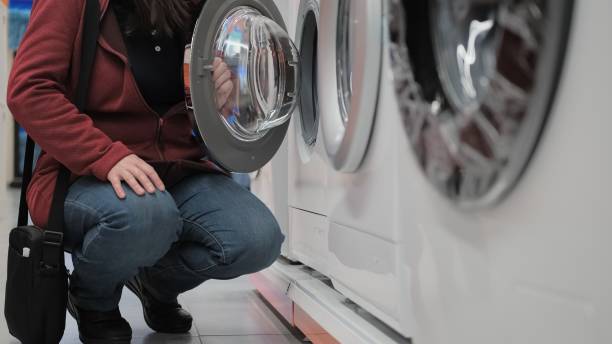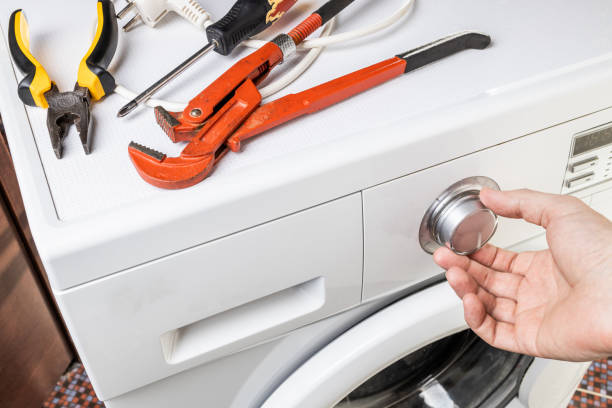A washing machine is one of the most essential appliances in any home, and when it breaks down, laundry can pile up fast, creating stress and inconvenience. From leaks and strange noises to a machine that won’t start, understanding basic washing machine repair can save time and money. While simple fixes can often be done at home, more complex problems should be handled by experts like Complete Appliance Care, Inc.
In this guide, we’ll walk you through step-by-step solutions for common washing machine issues, share preventative maintenance tips, and help you recognize when it’s time to call our trusted washer repair professionals.
Understanding Common Washing Machine Problems
Before you start repairing your washing machine, it’s essential to understand the exact problem. Most washer issues fall into a few common categories:

Machine won’t start: If your washer isn’t turning on, it could be due to a power supply problem, a damaged door lock, or a faulty control panel. Start by checking the outlet and power cord before calling a technician.
Water leaks: Leaks are often caused by cracked hoses, worn-out door seals, or loose connections. Fixing these problems early can help you avoid water damage and costly repairs.
Unusual noises: Strange sounds like banging, grinding, or squealing usually point to worn bearings, a loose drive belt, or foreign objects stuck inside the drum.
Drainage issues: If your washing machine won’t drain, the problem may be a clogged pump, blocked hose, or dirty filter. Regular cleaning can prevent this from happening.
Vibration and shaking: Too much shaking usually happens when the load is unbalanced, the floor is uneven, or the suspension rods are worn out. Resolving this quickly protects the machine and your floors.
Identifying these problems early will help you decide whether you can fix them yourself or if it’s time to call a washer repair company near you.
Step-by-Step Guide to Washing Machine Repair
Here’s a simple process for diagnosing and repairing your washer:

1. Check the Power and Settings
If your washing machine won’t turn on, ensure it’s plugged in and the outlet is working. Test the power cord and check the circuit breaker. Make sure the door is fully closed, as most machines won’t start otherwise.
2. Inspect Water Supply and Hoses
If your washer isn’t filling with water or is leaking, check the water valves and hoses. Tighten connections and replace any cracked or damaged hoses. It’s a good idea to inspect hoses every six months to avoid future leaks.
3. Clean the Drain Pump and Filter
A blocked filter or drain pump may prevent water from draining, leaving it sitting in the drum. Refer to your user manual to locate and clean these components. Regular cleaning prevents buildup and keeps your washer working efficiently.
4. Balance the Machine
Excessive vibration or shaking often means your washer is unbalanced. Adjust the legs so the machine sits evenly on the floor. Also, avoid overloading your washer, as it strains the drum and bearings.
5. Replace Worn Parts
Belts, bearings, and seals wear out over time. If you notice unusual noise, excessive leaks, or the drum not spinning, replacement parts may be necessary. A professional washer repair service can handle these repairs quickly and safely.
When to Call a Professional Washer Repair Company
While some washing machine problems can be fixed at home, others require expert attention. Call a washer repair company near you if:
Heavy leaks persist:
If water continues leaking even after inspecting hoses and seals, it’s time for professional help.
Drum won’t spin or is jammed:
A drum that won’t spin or rotate is often a sign of mechanical problems or motor failure.
Loud banging or grinding noises:
Strange sounds may indicate worn bearings, loose belts, or damaged components.
Electrical problems remain unresolved:
If resetting the breaker doesn’t fix it, electrical faults should be handled by a technician.
Error codes won’t clear:
Professional diagnostics can quickly resolve unknown error messages.
Getting a washer repair service ensures the issue is fixed correctly, prevents costly damage, and extends the lifespan of your appliance.
Preventive Maintenance Tips for Washing Machines
Consistent maintenance helps prevent expensive repairs and ensures your washing machine operates smoothly and efficiently. Follow these simple maintenance steps:
- Clean the drum and gasket: Wipe the rubber door gasket often to prevent mold, mildew, and foul odors.
- Run cleaning cycles monthly: Use a washer cleaner or white vinegar to remove detergent and mineral buildup.
- Avoid overloading the washer: Too many clothes can strain the drum, suspension, and motor.
- Inspect and replace hoses: Check your washer hoses regularly for cracks or leaks and replace them every 3–5 years to prevent flooding and keep your machine running safely.
- Keep the door slightly open: This improves airflow and prevents moisture buildup and mold growth.
By practicing these washer maintenance tips, you’ll extend your appliance’s lifespan, reduce breakdowns, and enjoy smoother laundry days.
Why Choose Complete Appliance Care for Washer Repair?
If DIY troubleshooting doesn’t solve the problem, trust Complete Appliance Care for reliable washer repair solutions. Our experienced technicians provide:
- Fast and efficient service for all washer brands and models
- Affordable repairs that save you time and money
- Friendly customer support and clear communication
- Flexible scheduling for your convenience
- A commitment to quality repairs backed by years of experience
When searching for a washer repair company near you, we’re your trusted choice for dependable, same-day service.
Conclusion
Basic washing machine troubleshooting can save you time and frustration, but when problems go beyond simple fixes, hiring a professional washer repair company is the smartest choice. At Complete Appliance Care, we pride ourselves on providing fast, reliable, and affordable washer repair services that restore your appliance’s performance and give you peace of mind.
Don’t let a faulty washer disrupt your day—schedule your washer repair service today and experience expert care that puts your convenience first.
FAQs
How much does washing machine repair cost?
Costs vary based on the issue, but most repairs are affordable compared to replacing the appliance. We provide upfront pricing so there are no surprises.
Can I fix my washing machine myself?
Yes, for simple issues like clogged filters or unbalanced loads. However, electrical or motor repairs should be done by professionals.
How often should I clean my washing machine?
Clean your washer at least once a month to prevent odors, mold, and detergent buildup.
What brands of washers do you repair?
We repair all major washer brands, including Whirlpool, Samsung, LG, GE, and Maytag.
How long does a washer repair take?
Most repairs can be completed in one visit, depending on parts availability and the complexity of the issue.
